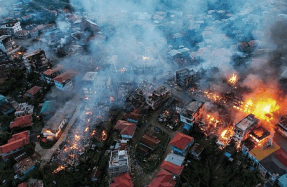

WARS HAVE A WAY of throwing the spotlight on labour relations—more so total wars, premised on men, munition and mobilisation. Key workers who are otherwise invisible at once become visible, not least because the working classes are critical to the prosecution of war. Yet, as the historian Radhika Singha shows, they are easily written out of history.
A flood of appreciation for the contributions of non-white soldiers to the Allied fight against the Central Powers filled the airwaves on the centenary of the First World War in 2014. Scarcely a murmur, however, was heard about their “followers”: those who worked as latrine cleaners, construction workers, mule drivers, stretcher bearers, water carriers, gardeners, blacksmiths, cooks, grooms, laundrymen, porters and sweepers. It is the agency of this class that Singha uncovers in The Coolie’s Great War: Indian Labour in a Global Conflict, 1914-1921.
A professor at Jawaharlal Nehru University in Delhi, Singha made her name with a history of colonial criminal law in the subcontinent in the late eighteenth and early nineteenth centuries, in particular the tensions between its simultaneously metropolitan and native character. It is another tension, between combatants and non-combatants in an age when that distinction counted for less and less, that is at the heart of her latest book.
It is a judicious, well-written history. Despite its heavy subject matter, Singha maintains a light, ironic touch, for the better part letting her archive speak for itself. More than a decade in the making, her book is a bottom-heavy tome. Footnotes compete for space with the main text, very often taking up more paginal real estate. Understandably so. The Indian Labour Corps’ is a fragmentary archive, and Singha has had to scour diaries, memoirs, reports and more than a dozen archives—including in Kurukshetra and Kew, Bhubaneshwar and Bangalore—to tell its






